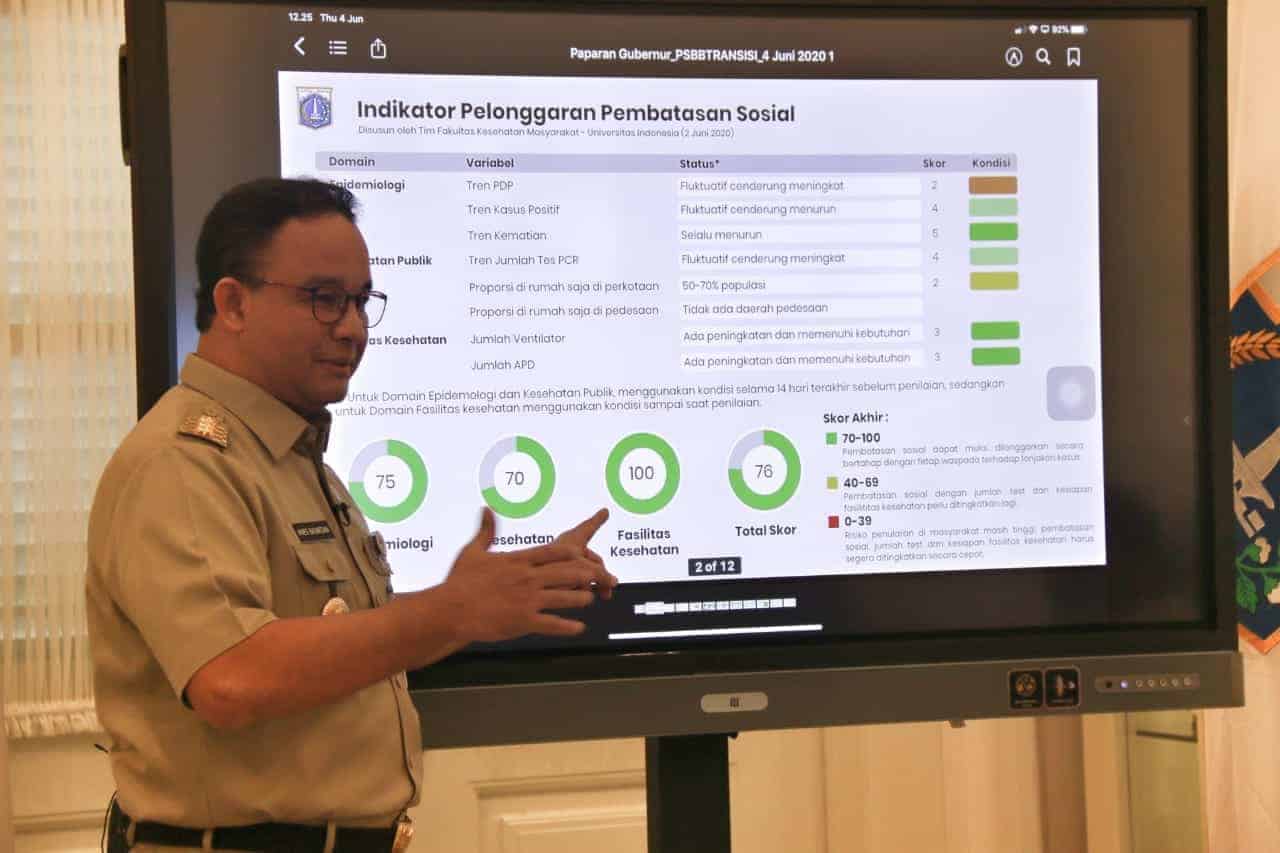
""
The Provincial Government of DKI Jakarta has evaluated the period of the third Large-Scale Social Restrictions (PSBB) imposed in the Capital City. The Governor of DKI Jakarta, Anies Baswedan, explained based on scientific studies from the Faculty of Public Health Team, University of Indonesia, the estimated effective reproduction number (Rt) COVID-19 in Jakarta until June 4, 2020 was recorded at 0.99.
Furthermore, Anies explained, there are three indicators for easing social restrictions:
- Epidemiology: PDP trend in Jakarta is fluctuating tend to increase, Positive Case Trend is fluctuating tend to decrease, and Death Trend is always decline. Rating: 75
- Public Health: The fluctuating trend in the number of PCR tests in Jakarta tend to increase, the proportion at home in urban areas is 50 to 70%. Rating: 70
- Health facilities: The number of ventilators and the number of PPE in Jakarta is increasing and meeting the needs. Rating: 100
The total score of the three indicators is 76. So that PSBB can be relaxed gradually by staying alert to case surges. "When viewed from the daily positive cases and the number of daily deaths as of June 3, 2020, the Jakarta graph is relatively down, from the national and outside DKI Jakarta charts," Anies explained.
In addition, from the mapping of village office according to the COVID-19 Incident Rate (IR) rate per 100,000 population, in the period of 15 to 30 May 2020, the majority of Jakarta has also been green (IR rate 0) and yellow (IR rate 0.1 - 24.63).
However, given the potential transmission can still happen, especially since there are still 66 RWs that are prone to transmission of COVID-19, the Task Force for the Acceleration and Handling of COVID-19 in DKI Jakarta has set PSBB extended and June is set as a transitional period.
"All sanctions against PSBB violations will continue to apply. Violations of the obligation to use masks will also be deal with," Anies added.
In the transition period, the Provincial Government of DKI Jakarta will conduct a period of education and habituation of healthy and safe lifestyles according to the COVID-19 protocol. Furthermore, the transition period from a period of restriction to the expansion of productive socio-economic activities. The transition period is designed in two phases: Phase I and Phase II. Each phase is valid for one month, and can be extended according to the results of monitoring of COVID-19 outbreak control conditions.
The Provincial Government of DKI Jakarta will also implement an Emergency Brake policy in this transition period. "It means, if there is an alarming level of transmission, we can stop all activities and re-implement tightening," Anies said.
There are general principles and health protocols that need to be underlined and taken into account in the implementation of the Transitional PSBB, among others:
General Principles:
- Healthy people are allowed to do activities outside the home.
- Unhealthy people are prohibited from doing activities outside the home.
- Facilities are only used with a capacity of 50%.
- Must use a mask doing activities outside the home.
- Keep a safe distance of 1 meter between people.
- Wash your hands with soap regularly.
- Applying cough and sneezing ethics.
- For certain activities, elderly citizens (60+ years), pregnant women, and children are not yet allowed.
Workplace Protocols:
- The proportion of employees who work in an office is 50% of all employees, the other 50% must work from home.
- Each office / business divides the work hours of its employees who are in the office in two different time groups (a minimum difference of 2 hours) to control capacity when mobility comes, goes home, and take a break. (For example: 50% of employees start working at 7:00 a.m. and break at 11:00; another 50% start at 9:00 p.m. and break at 12:30)














